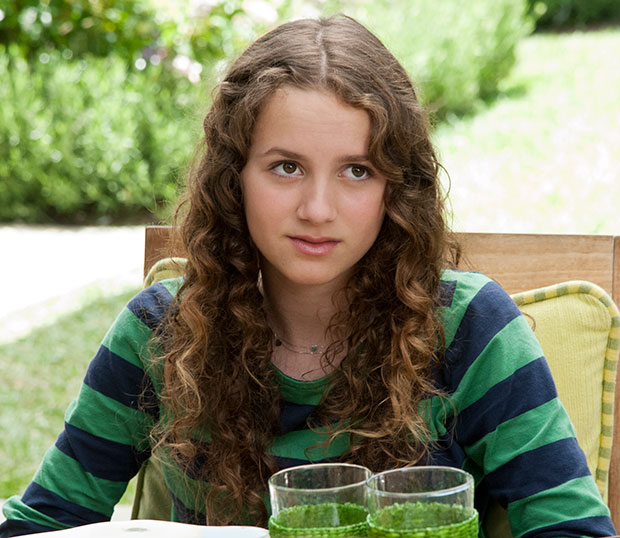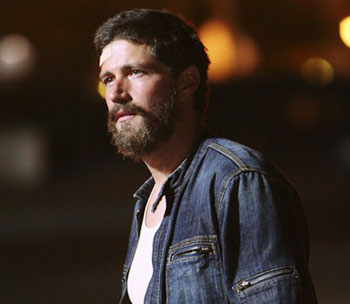
Note: This article contains spoilers regarding the endings of both This Is 40 and Lost.
Judd Apatow continues his trend of cataloguing life’s dips and peaks with This Is 40, his revival of Knocked Up supporting characters Pete (Paul Rudd) and Debbie (Leslie Mann). Here, the pair is charged with the central task of exemplifying the middle age: money problems, troublesome family members, a deterioration of their romantic relationship… and, above all, Lost. While the spotlit couple deal with issues like attempting to cut the perpetual cash flow to Pete’s needy father (Albert Brooks), and shooting away to brief vacations in the effort to revive their sensual passions, the pair’s middle school-aged daughter Sadie (played by Apatow and Mann’s daughter Maude) undertakes her own emotional arc. It doesn’t much have to do with her entry into puberty, her chaotic relationship with her younger sister (Iris Apatow), or the Tom Petty-lookalike (Ryan Lee of Super 8) who makes her a target of his Internet bullying. In fact, it has to do entirely with Lost, and her wide-eyed experience binge-watching the ABC drama for the first time on her iPad.
GALLERY: Paul Rudd is 40?! And More Stars Who Never Age
At the beginning of the movie, we learn that Sadie is quite a ways through the island series, nearing the hotly contested finale with vigor, when her parents put a cork in the household’s Internet access. Sadie is forbidden from watching any more Lost; Pete and Debbie are concerned about how obsessed their daughter has become with the show. As the movie carries forth, Sadie vocalizes heated complaints about her parents’ decision, growing anxious over her lack of narrative closure (they cut her off with only a few episodes to go). Sadie lashes out against Pete and Debbie, identifying Lost as a complex and important emotional saga, and defending it against her father’s preferred television choice of Mad Men. It’s fair to say that the vast majority of Sadie’s dialogue at least revolves around, if not delving into explicit and lively detail on, Lost.
Even with the pop culture reference pandemic that has overtaken the film and television industry, it is unprecedented for a movie to devote such a large amount of its screentime, not to mention emotional revenue, to a separate piece of contemporary fiction. A This Is 40 viewer could argue that Sadie’s entire character arc revolves around her watching of the show. The adolescent daughter of Pete and Debbie enters our lives with one clear-cut mission: to complete the ABC series. Her primary conflict arises when her parents deny her this right. Emotional turmoil overtakes Sadie in this chapter of the story, launching her into manic tangential scenarios such as a pattern of escalating fights with her affectionate younger sister, and aforementioned digital face-off with a seemingly insensitive classmate. But even with enough meat to stand independently, both of these side stories — likewise Sadie’s uneasy relationship with her estranged maternal grandfather (John Lithgow) — are satisfied by the impassioned young lady’s lifted prohibition. At last, she triumphs in concluding the six-season drama, bawling openly to her father about the fates of her favorite characters. “They were all dead,” Sadie cries, hoping to transmit the significance of this horror to an uninterested Pete. Her world is upside down.
 The Lost finale is one of much contention among fans and critics of the show. The oppositional camp is a highly populated community of those dissatisfied with a “cop-out” conclusion that fails to answer the slew of questions propagated over the years. It seems, at first, that Sadie might subscribe to this philosophy. Mourning the loss of Jack, Sawyer, et al, Sadie appears unnerved by the apparent meaninglessness of it all, unable to identify how she might tackle the confusing elements of her own life in light of the near certainty that in the end, none of her own mysteries will find solutions. But whether Sadie knows it or not at this point, the Lost finale speaks to her.
The Lost finale is one of much contention among fans and critics of the show. The oppositional camp is a highly populated community of those dissatisfied with a “cop-out” conclusion that fails to answer the slew of questions propagated over the years. It seems, at first, that Sadie might subscribe to this philosophy. Mourning the loss of Jack, Sawyer, et al, Sadie appears unnerved by the apparent meaninglessness of it all, unable to identify how she might tackle the confusing elements of her own life in light of the near certainty that in the end, none of her own mysteries will find solutions. But whether Sadie knows it or not at this point, the Lost finale speaks to her.
The Sadie we see following her first run through Lost‘s final episode begins to show a new appreciation for the very thing her series has suggested to be the ultimate priority: the people around her. In the final act of the movie, the post-finale chapter for Sadie, she begins to extend new olive branches to figures whose enmity she once cherished. Her younger sister Charlotte, once a detested nuisance, becomes her friend and accomplice. Her bully Joseph, a sworn enemy with whom she traded scathing insults, earns what is suggested to be romantic affection. And even her grandfather Oliver, a stranger initially distrusted by Sadie, is afforded her investment as a new member of her family. Yes, the Lost finale (whose supportive camp is one at which I’ve worked as head counselor for the past two summers) shirks the answers to some of the show’s captivating science-fiction and fantasy riddles. But in doing so, it only upholds the theme that life itself is bound to disappoint in this avenue. We will always be wanting for answers, certainties, a semblance of meaning. But what we can, and should, direct our attention to is the importance of the people around us. The love we feel for them, the substance they have brought to our lives. Each relationship we have is unique, and for better or for worse, a contributing factor to who we are. The people around us are what matter most, and that is what Lost, and its newest supporting camper Sadie, understand.
Sadie’s final scene in This Is 40 pits her among a conglomerate of her conflicting parties Charlotte, Joseph, and Oliver, in her household’s living room, treating them each to their first go at the Lost finale. Without the context of the bulk of the series at their disposal, the significance of Jack’s drooping eyelids as he lies enlightened in that island brush — evading the dastardly fate of “dying alone” (a theme so fervently illustrated by the show) thanks to the doting company of the all-important character of Vincent the yellow lab — seems to fall short of their grasp, with Oliver especially vocalizing his wanting confusion. But Sadie’s satisfaction this time around is palpable. All that the passengers of Flight 815 has was each other. And as Sadie now understands, all she has are the people in her life: her often grating but sincerely loving parents, her classmates and friends (even the Tom Petty-looking ones), her extended family (a community into which she is willing to welcome Oliver), and, creating the most touching relationship in the whole movie (especially to anyone who grew up with a sibling), her younger sister Charlotte. These people, more than anything else that might have distracted and corroded her throughout the movie, are what matter. And thanks to Lost, she learns with newfound drive to love and appreciate them. And this is a truth — the one certainty we might actually land upon in this vast, mysterious island series of our own — to which we should all adhere. After all, you know the old saying: we live together, or we die alone.
[Photo Credit: Universal, ABC]
‘This Is 40’: Judd Apatow on Staying Relevant and P.T. Anderson’s Love of ‘Heavyweights’
From ‘This Is 40’ to Hitchcock to ‘Wolverine’: A Brief History of Spin-off Movies
Wait, Paul Rudd is Over 40? 16 Stars Who Don’t Age – GALLERY
You Might Also Like:
 20 Hottest Bikini Bodies of 2012: Megan Fox and More!
20 Hottest Bikini Bodies of 2012: Megan Fox and More!




